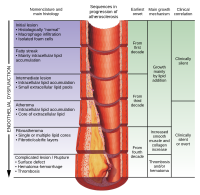
Photo from wikipedia
Objective: As endothelial dysfunction is an early event in atherosclerosis formation, we investigated if proteins previously related to cardiovascular disease also were related to endothelial function using a novel targeted… Click to show full abstract
Objective: As endothelial dysfunction is an early event in atherosclerosis formation, we investigated if proteins previously related to cardiovascular disease also were related to endothelial function using a novel targeted proteomics approach. Methods: In the Prospective Investigation of the Vasculature in Uppsala Seniors (PIVUS) study (n = 850–970, all aged 70 years), endothelium-dependent vasodilation (EDV) in the forearm was assessed by intra-arterial infusion of acetylcholine. Flow-mediated vasodilation (FMD) was investigated in the brachial artery by ultrasound. The same investigations were carried out in the Prospective investigation of Obesity, Energy and Metabolism (POEM) study (n = 375–461, all aged 50 years). After strict quality control, 84 cardiovascular-related proteins measured by the proximity extension assay were studied in relation to EDV and FMD in PIVUS (discovery sample) and POEM (validation sample). Results: Of the 15 proteins being significantly related to EDV in PIVUS (false discovery rate <0.025), seven could be replicated in POEM at nominal significance and same effect direction when adjusted for sex and storage time. Of those, only cathepsin D remained significant following further adjustment for traditional cardiovascular risk factors (beta, −0.08; 95% confidence interval, −0.16, −0.01; P = 0.033; change in ln-transformed EDV per 1-SD increase in protein level). No protein was significantly related to FMD. Conclusion: Using a discovery/validation approach in two samples, our results indicate an inverse association between plasma cathepsin D levels and endothelial-dependent vasodilation.
Journal Title: Journal of Hypertension
Year Published: 2019
Link to full text (if available)
Share on Social Media: Sign Up to like & get
recommendations!